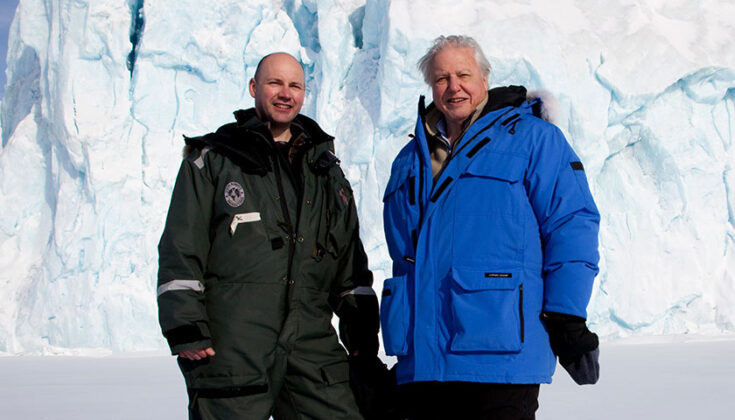Raising awareness, informing attitudes, challenging preconceptions – television remains a massively influential medium. The BBC’s hugely popular nature documentaries are perfect examples of beautifully made programmes that create a lasting impression.
Iconic series such as Blue Planet II, Planet Earth II and Frozen Planet have delivered a dramatic wake-up call to the world on key environmental issues, from climate change to plastic pollution of the oceans. To be effective, programmes like these have to harness the very best, very latest environmental research and the incredible new insights it generates.
About the project
The Natural Environment Research Council’s (NERC) British Antarctic Survey (BAS) has a long-term relationship with the BBC’s Natural History Unit. Involved in all of the recent blockbusters, BAS staff have contributed to programme development, facilitated access to the polar regions, appeared onscreen, and worked with camera crews to apply new technology and techniques to capture ground-breaking footage.
Frozen Planet and Blue Planet II were both co-productions between the Natural History Unit and The Open University (OU), with NERC-supported researchers at the OU playing a crucial role as series advisors.

Dr Lucy Quinn was one of the academic consultants on the BBC’s landmark Blue Planet II documentary series. Credit: John Dickens.
All three academic consultants working on Blue Planet II, who were based at the universities of Exeter, Oxford and York, were NERC-funded researchers. In total, NERC had supported 95% of all UK-based science advisors that contributed to the series, through research grants, studentships and institutional funding.
“We simply couldn’t make programmes like Blue Planet II without the insight and support of the UK environmental science community,” says James Honeyborne, Executive Producer of Blue Planet II. “We look forward to strengthening these close collaborations in the future.”
The scientists behind the successes
Professor Mark Brandon
A renowned polar scientist, Mark was Principal Academic Advisor on Frozen Planet. He helped shape the content of the series – including Sir David Attenborough’s distinctive, thought-provoking documentary and his own NERC-supported work on Antarctic ocean circulation and on ice-sheet melting, carried out using NERC’s autonomous underwater vehicles.
Dr Lucy Quinn
Lucy provided the focus of one of the most harrowing, most talked-about sequences in Blue Planet II in which albatross parents were seen to be feeding plastic to their young. In an interview filmed on location in South Georgia, she revealed how plastic debris polluting the world’s oceans is seriously harming seabird populations. This problem was originally discovered as a result of long-term NERC-funded monitoring of bird populations.
Professor Steve Simpson
A marine biologist, fish ecologist and twice a NERC Fellow, Steve was a Series Academic Advisor on Blue Planet II. Appearing on screen in the final episode, he revealed how the seemingly silent aquatic world is actually filled with noise – including human-made disturbances that are increasingly affecting animal behaviour in the world’s seas and oceans.
Impacts of the project
Inspiring vital environmental action
In total, over a billion people worldwide saw Blue Planet II and Planet Earth II, while Frozen Planet – the first prime-time BBC1 show to devote an entire hour to the effects of climate change on polar regions – was the UK’s most-watched natural history programme for a decade.
The impact of the BBC’s nature documentaries is correspondingly huge. Blue Planet II, for example, catapulted plastic pollution up the public agenda in the UK and internationally, changing perceptions and behaviour, and has been cited repeatedly in policy announcements and calls for action, including a high-profile speech by the Prime Minister, Theresa May, in January 2018.
Generating valuable export income
Blue Planet II was BBC Worldwide’s most popular programme of 2017-18, selling to 234 territories by year-end, while a £300 million deal between the BBC and the Discovery Channel for natural history programmes, represents “the largest content deal the BBC has ever done,” according to the BBC’s Director General.
Boosting British science worldwide
The documentaries add to the UK’s ‘soft power’ by projecting a compelling image of the UK as a global leader in the production of high-quality, high-impact TV and in environmental science that delivers profound real-world benefits. In the US, Blue Planet II became the most watched advertising-supported nature documentary in nearly eight years and the same series amassed over 250 million views on China’s Tencent video-on-demand service.
Find out more
Find out more about Blue Planet II and watch excerpts from the series.
Watch excerpts from the Planet Earth II series.
Find out more about the Frozen Planet television programme.
Top image: Professor Mark Brandon and Sir David Attenborough. Credit: Open University.

